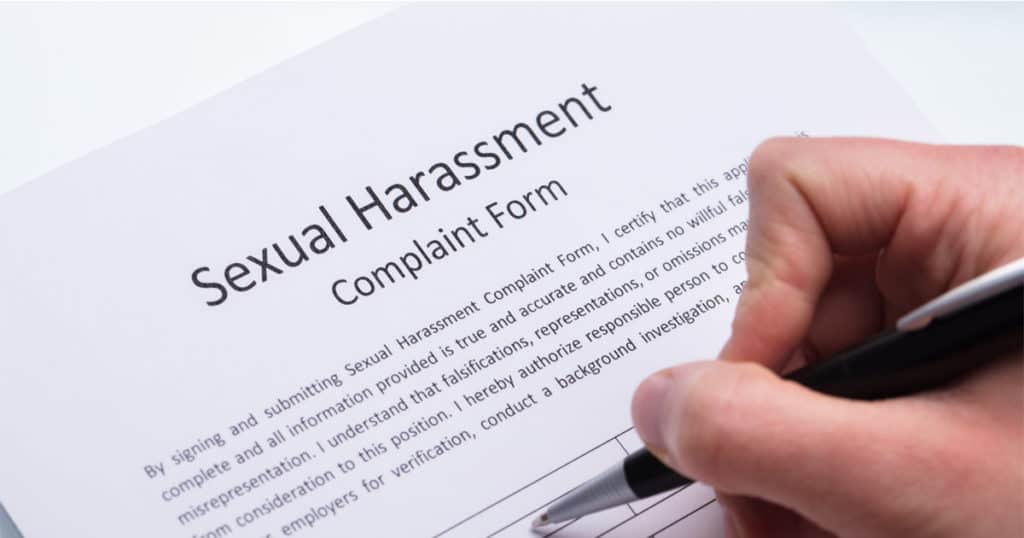Unwelcome Request for Sex
Coworkers must treat each other with respect and dignity, and they should see each other as colleagues. Not everyone working together will get along, but employees must at least be courteous and kind to each other. On some occasions, an office romance will blossom. That is fine as long as it does not go against office protocols, and both of the participants are consenting adults.
Complications arise when one person takes an interest in another, and those feelings are not shared or reciprocated. Making unwelcome requests for sex to a coworker is a form of sexual harassment. It makes a person uncomfortable and causes anguish.
Those who are facing persistent sexual advances from a manager or a coworker do not have to endure that. There are options available to them to report the incident. While a lawsuit is possible, that should serve as a last resort. An experienced sexual harassment lawyer can advise an employee how to handle the situation and move forward.
What is an Unwanted Sexual Request?
An unwanted sexual request takes place when an employee feels uncomfortable over an interaction between them and another coworker. If the victim complains about the situation and it continues, then it becomes unwanted.
There are obvious cases of unwanted sexual advances, such as when a boss requests sex from an underling. However, the situation can be more nuanced as well and can be initiated by a coworker.
There is a variety of situations that qualify as unwanted sexual requests. Some examples include:
- When a coworker repeatedly asks a colleague for dates or sex.
- When a boss offers an employee a promotion, special treatment, or an increase in pay in exchange for sex (this is referred to as quid pro quo).
- An employee offers another staff member sexual favors in exchange for special treatment.
- A coworker threatens to report or in some way adversely affect the employment of a colleague who has denied their sexual advances.
The request does not need to come from someone who has authority over another nor does it have to come from someone of a different gender. Additionally, the request does not have to be intercourse, it can be a request for any type of sexual activity or repeated requests for a date.
In most instances, requests for sex may not be very blatant, but more subtle. A situation could also escalate into an unwanted sexual request. What could start off as an innocent drink after work can quickly escalate into unwanted sexual advances.

What Should I Do if I am Dealing With Unwanted Requests for Sex at Work?
An initial sexual request may not be warranted as unwanted because the person being asked has not previously expressed that the request makes them feel uncomfortable. Therefore, it is vitally important for anyone who is uncomfortable with such an advance to inform the other employee right away. They should explain why it made them uncomfortable and ask them to stop.
If the person making the request does not relent or retaliates, then the employee needs to take their complaint to their supervisor, assuming it is not the person making the request. If the supervisor is the one making the request, the employee should go to their supervisor’s manager or report it to the company’s Human Resources (HR) department.
Once a complaint is filed with HR, the employer should complete an investigation to ascertain the facts and attempt to resolve the problem. If HR fails to resolve the problem or chooses not to resolve if, then an employee is within their rights to contact a sexual harassment lawyer and consider their legal options against the individual and the company. If HR does not do its job in fixing the situation, then the company is in violation of failing to provide a safe and healthy work environment for its employees.
What are the Legal Obligations of My Supervisor?
Employers are under a legal obligation to provide a safe workplace for all of their employees. To do that, they need to enact policies that prohibit the mistreatment of fellow employees. However, just having policies in place is not sufficient. Those policies must be acted upon and enforced. If a company fails to follow through, it can be held liable for any sexually harassing behavior engaged in by its employees.
There are five factors that courts will use to determine the authenticity of a company’s intention to maintain workplace safety:
- A formal policy that prohibits sexual harassment in the workplace.
- The company has formal and informal complaint structures for employees to use if they are experiencing sexual harassment on the job.
- It requires sexual harassment training for all supervisors and managers and makes that same training available to employees.
- Includes effective sensing or monitoring mechanisms to check the trustworthiness of anti-harassment policies and internal and external complaint structures.
- The company has made an unequivocal commitment from the highest levels that sexual harassment is never tolerated. This commitment must be demonstrated via consistent practice.
In New Jersey, the courts have ruled that a company is not held liable for harassment within the office if they have reasonable policies in place to prevent such action and if the victim fails to take advantage of the available tools and processes in place.
Are Unwanted Sexual Requests Illegal?

Under federal and state law, it is illegal to demand sexual favors from an employee. It can be considered a form of harassment, which is not something that is tolerated. The Pennsylvania Human Relations Act (PHRA) and the New Jersey Law Against Discrimination (NJLAD) prohibits sexual harassment in the workplace. Title VII of the Civil Rights Act of 1964 addresses sexual harassment at the federal level. These laws also lay out the legal options for victims.
Prior to filing a lawsuit, a victim has a right to file a complaint with the U.S. Equal Employment Opportunity Commission (EEOC). However, there are state options as well with either the Pennsylvania Human Relations Commission (PHRC) or the New Jersey Division on Civil Rights within the Office of the Attorney General.
Philadelphia Sexual Harassment Lawyers at The Gold Law Firm P.C. Respond When Employees Face Unwanted Sexual Advances
If you have a coworker or even a manager who is making unwanted sexual advances toward you at work and you want it to stop, the Philadelphia sexual harassment lawyers at The Gold Law Firm P.C. can help. Call us at 215-569-1999 or contact us online for a free consultation. Our offices are located in Philadelphia and Pennsauken, New Jersey, and we serve clients throughout South Jersey and southeastern Pennsylvania, including Wilkes-Barre, Scranton, northeast Philadelphia, Bucks County, Chester County, Delaware County, and Montgomery County, as well is in New York.



































